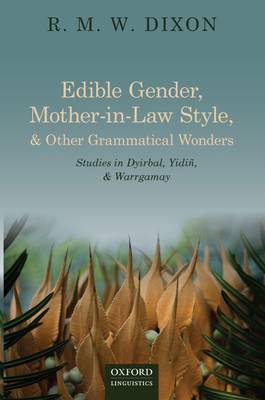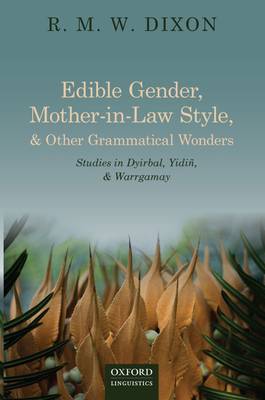
Bedankt voor het vertrouwen het afgelopen jaar! Om jou te bedanken bieden we GRATIS verzending (in België) aan op alles gedurende de hele maand januari.
- Afhalen na 1 uur in een winkel met voorraad
- Gratis thuislevering in België vanaf € 30
- Ruim aanbod met 7 miljoen producten
Bedankt voor het vertrouwen het afgelopen jaar! Om jou te bedanken bieden we GRATIS verzending (in België) aan op alles gedurende de hele maand januari.
- Afhalen na 1 uur in een winkel met voorraad
- Gratis thuislevering in België vanaf € 30
- Ruim aanbod met 7 miljoen producten
Zoeken
Edible Gender & Other Gramm Wonders P
Studies in Dyirbal, Yidin, and Warrgamay
Dixon
Paperback | Engels
€ 66,45
+ 132 punten
Omschrijving
This book builds on R. M. W. Dixon's most influential work on the indigenous languages of Australia over the past forty years, from his trailblazing grammar of Dyirbal published in 1972 to later grammars of Yidiñ (1971) and Warrgamay (1981). Edible Gender, Mother-in-Law Style, and Other Grammatical Wonders includes further studies on these languages, and the interrelations between them. Following an account of the anthropological and linguistic background, Part I provides a thorough examination of, and comparison between, the gender system in Dyirbal (one of whose members refers to 'edible vegetables') and the set of nominal classifiers in Yidiñ. The chapters in Part II describe Dyirbal's unusual kinship system and the 'mother-in-law' language style, and examines the origins of 'mother-in-law' vocabulary in Dyirbal and in Yidiñ. There are four grammatical studies in Part III, dealing with syntactic orientation, serial verb constructions, complementation strategies, and grammatical reanalysis. Part IV covers grammatical and lexical variation across the dialects of Dyirbal, compensatory phonological changes, and a study of language contact across the Cairns rainforest region. The two final chapters, in Part V, recount the sad stories of how the Yidiñ and Dyirbal languages slowly slipped into oblivion.
Alleen bij Standaard Boekhandel
+ 132 punten op je klantenkaart van Standaard Boekhandel
Beoordelingen
We publiceren alleen reviews die voldoen aan de voorwaarden voor reviews. Bekijk onze voorwaarden voor reviews.










